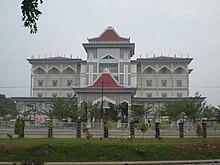The examples and perspective in this article deal primarily with Malaysia and do not represent a worldwide view of the subject.(November 2024) |


Syariah (Jawi: شرعية, the Malay spelling of "Sharia") refers to sharia law in Islamic religious law and deals with exclusively Islamic laws, having jurisdiction upon every Muslim in Malaysia. The Syariah Court system is one of the two separate court systems which exist in the general Malaysian legal system. There is a parallel system of state Syariah Courts, which have limited jurisdiction over matters of state Islamic law. Syariah Courts have jurisdiction only over Muslims in matters relating to family law and religious observance, and can generally only pass sentences of not more than three years' imprisonment, a fine of up to RM5,000, and/or up to six strokes of the cane. [1]
Contents
- Chief judges of the Syariah Court
- Judges of the Syariah Court of Appeal
- Current judges
- See also
- References
- External links
Article 145 of the Malaysian constitution says the Attorney General of Malaysia has no power over matters related to the Syariah Courts.
There are three levels of the courts: Appeal, High, and Subordinate. [2]
Unlike Malaysian civil courts, which are federal in scope, Syariah Courts are primarily established by individual state law. Similarly, Islamic law is a matter limited to each state, with the exception of the Federal Territories of Malaysia, as provided in Article 3 of the constitution. Thus, the application of sharia law may differ among the states. There are 13 state sharia law departments and one for the Federal Territories.